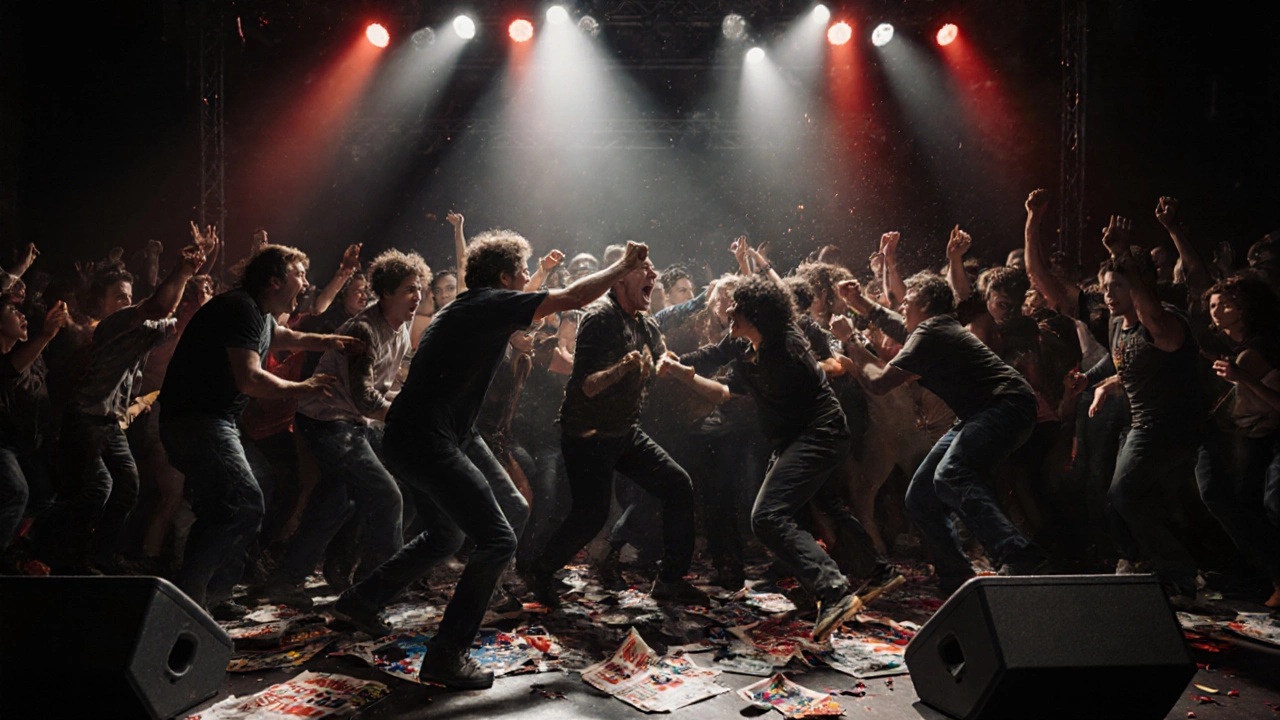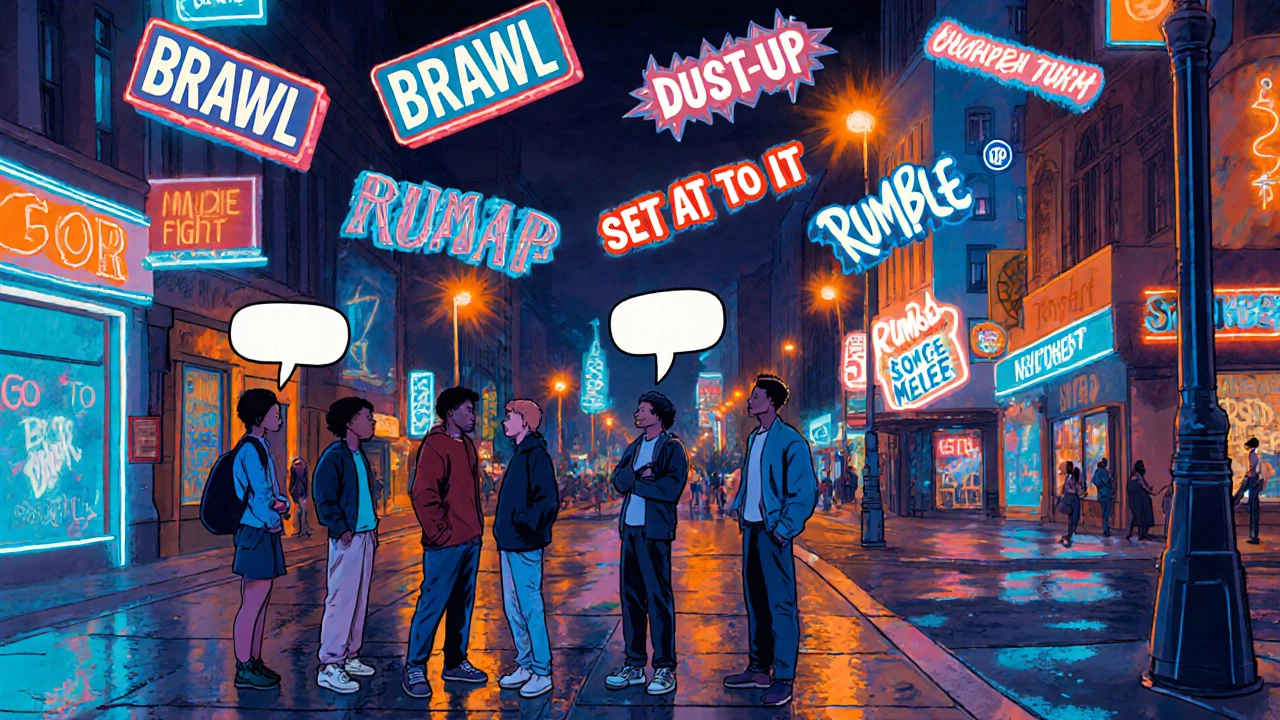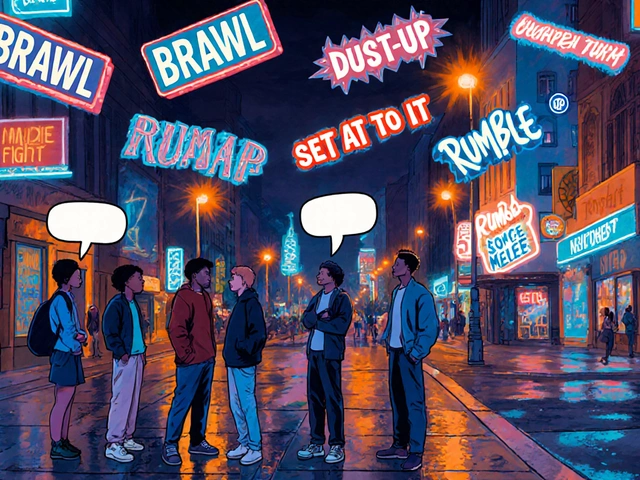Slang for a Fight: Interactive Guide
brawl
Noisy, chaotic fight
scrap
Short, spontaneous fight
dust-up
Heated argument that may get physical
throw down
Challenge to fight / act of fighting
set to
Start fighting (British slang)
go at it
Engage in a fight, often humorously
rumble
Planned gang fight
melee
Chaotic hand-to-hand fight with many
Selected Term Details
Click on any term above to view its details.
Usage Tips
- Match the vibe: Use more neutral words like "brawl" or "scrap" in mixed company; reserve "throw down" for friends who know the slang.
- Mind the formality: In formal settings, stick to plain "fight" or "altercation." Slang belongs in casual chats, lyrics, or fictional dialogue.
- Watch the context: Some terms carry a heavier connotation. "Rumble" often hints at organized gang fights.
- Listen first: If your conversation partner uses a particular term, mirror it to build rapport.
Key Takeaways
- Learn the most popular slang words for a fight in the US, UK, Australia and beyond.
- Understand each term’s meaning, typical region, and how informal it sounds.
- Get practical examples so you can use the slang naturally in conversation.
- Spot common mistakes and when to avoid using fight slang.
- A quick reference table lets you compare the terms at a glance.
Ever heard someone say, "They had a dust‑up last night" and wondered what that actually means? When people talk about a slang for fight they’re using informal words that replace the word "fight" in everyday chatter. This article breaks down the most common slang terms, shows you where they’re used, and gives you the confidence to drop them into your own conversations without sounding forced.
What Makes Fight Slang Tick?
Slang thrives on brevity, color, and identity. A single word can instantly paint a picture of a rough, spontaneous clash, or a more light‑hearted scuffle. These terms often originate from sub‑cultures-street crews, sports teams, musicians-and then spread to wider audiences through movies, music and social media. Because slang can be regional, a term that feels natural in London might be confusing in Sydney.
Most Common Slang Words for a Fight
Below are the go‑to expressions you’ll hear on the streets, in pubs, or on online forums. Each is introduced with a short definition and a real‑world example.
- brawl is a noisy, chaotic fight involving multiple people. Example: "The night after the concert turned into a full‑blown brawl."
- scrap is a brief, often spontaneous fight. Example: "Two brothers got into a scrap over the last slice of pizza."
- dust‑up is a short, heated argument that may turn physical. Example: "There was a dust‑up at the bar when the bartender ran out of beer."
- throw down is to challenge someone to a fight; also the act of fighting. Example: "He threw down after the rival team stole his bike."
- set to is British slang meaning to start fighting. Example: "The lads were set to when the referee blew the whistle."
- go at it is to engage in a fight, often used humorously. Example: "When the cats saw each other, they went at it right away."
- rumble is a planned fight, especially among gangs. Example: "The west‑side crew scheduled a rumble for Saturday night."
- melee is a chaotic, hand‑to‑hand fight involving many participants. Example: "The concert ended in a melee after the power went out."

Regional Flavors of Fight Slang
Even within English‑speaking countries, slang can vary a lot. Knowing where a term comes from helps you decide if it fits the conversation.
- USA: "throw down," "brawl," "dust‑up" dominate pop culture, especially in hip‑hop and sports commentary.
- UK: "set to," "scrap," and "dust‑up" are common in British TV dramas and everyday speech.
- Australia: "go at it" often appears in Aussie slang lists, while "brawl" is universal.
- Canada: Canadians tend to borrow from both US and UK, so you’ll hear "throw down" and "set to" interchangeably.
How to Use Fight Slang Naturally
Throwing in slang can make you sound relatable, but the key is timing and audience. Follow these tips:
- Match the vibe: Use more neutral words like "brawl" or "scrap" in mixed company; reserve "throw down" for friends who know the slang.
- Mind the formality: In a news article or work email, stick to plain "fight" or "altercation." Slang belongs in casual chats, lyrics, or fictional dialogue.
- Watch the context: Some terms carry a heavier connotation. "Rumble" often hints at organized gang fights, so avoid it unless you mean that specifically.
- Listen first: If your conversation partner uses a particular term, mirror it. It builds rapport and shows you understand the sub‑culture.
Quick Reference: Compare the Terms
| Term | Core Meaning | Typical Region | Formality |
|---|---|---|---|
| brawl | noisy, chaotic fight | US, Canada | low‑to‑medium |
| scrap | short, spontaneous fight | US, UK | low |
| dust‑up | heated argument that may get physical | US, UK | medium |
| throw down | challenge to fight / act of fighting | US | low |
| set to | start fighting (British slang) | UK | medium |
| go at it | engage in a fight, often humorously | AU, US | low |
| rumble | planned gang fight | US | low‑to‑medium |
| melee | chaotic hand‑to‑hand fight with many | US, UK | medium |

Common Pitfalls and How to Avoid Them
Even native speakers slip up on slang. Here’s what to watch out for:
- Over‑use: Dropping a slang term every sentence sounds forced. Use it sparingly.
- Mis‑placement: Saying "We had a rumble" about a friendly sparring session may confuse listeners.
- Wrong audience: An older relative might not understand "throw down," leading to awkward clarifications.
- Regional mix‑up: Using "set to" in a US Midwest setting could sound out of place.
Frequently Asked Questions
Is "brawl" always illegal?
Not necessarily. "Brawl" describes the nature of the fight-loud and chaotic-without implying legal status. A friendly schoolyard scuffle can be called a brawl, but a public disturbance may also be labeled a brawl by police.
Can I use "dust‑up" to describe a verbal argument?
Yes. "Dust‑up" often starts as a heated verbal exchange and may or may not turn physical. It’s a safe choice when you’re unsure whether the conflict escalated.
Which term sounds the most aggressive?
"Rumble" and "melee" carry the strongest aggressive connotations, especially because they suggest multiple participants and a planned nature.
Is "throw down" appropriate for a sports match?
Absolutely. In basketball or street basketball circles, "throw down" often describes an intense, physical duel on the court.
How do I sound natural when using these terms?
Listen to native speakers-movies, podcasts, local conversations-and mimic the rhythm. Start with one term you enjoy and sprinkle it in relevant stories. Over time it will feel effortless.
Wrap‑Up
Now you’ve got a toolbox of slang for describing fights-from the chaotic "brawl" to the planned "rumble." Use the right term for the right crowd, keep an eye on regional quirks, and you’ll add punchy flavor to your conversations without tripping over yourself.

